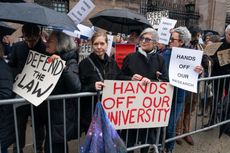The case for flogging
If the lash makes you queasy, the prison system should make you vomit


In 2010, the NGO Human Rights Watch estimated that at least 140,000 prison inmates had been raped. According to the group Stop Prisoner Rape, the figure is above 200,000 per year.
On average, once people have spent time in prison, their illegal earnings go up, not down, meaning they engage in more, and perhaps more advanced, criminality.
I bring this all up, just as a way of framing the discussion about which punishments are considered civilized, cruel, or demeaning.
Subscribe to The Week
Escape your echo chamber. Get the facts behind the news, plus analysis from multiple perspectives.

Sign up for The Week's Free Newsletters
From our morning news briefing to a weekly Good News Newsletter, get the best of The Week delivered directly to your inbox.
From our morning news briefing to a weekly Good News Newsletter, get the best of The Week delivered directly to your inbox.
You see, last week I wrote a column arguing that we should abolish prisons. The case for the unacceptability of prison for civilized society took long enough to make, but since I am always — and legitimately — asked about potential alternatives, I sketched them out. One of the ones I put forward was flogging.
This generated quite a bit of internet outrage.
Most countries that use the lash are Islamic, but some non-Islamic Asian countries like Singapore use it as well. The most common forms either use a cane or a whip — I'm agnostic about which to use. And most of them don't condemn people to hundreds of lashes (though it happens) — the idea is neither to kill nor to spend too much time doing it.
Do you think the lash is cruel? Do you think the lash is uncivilized? Is it beneath a modern society to tolerate such a thing? Given that the problem we tolerate literally involves systemic rape, I think even asking those questions is obscene. But let's go.
No, the lash is not pleasant — it is a form of punishment. A whip rips skin off your flesh, yes. But prison takes away your life.
It is also a form of punishment that has many advantages: It is cheap; it is quick; it is humiliating without being too humiliating. I think there's a potential that at least some thuggish teenagers might be so shaken by the experience so as to rethink their lives.
In other words, it doesn't have the drawbacks of prison: the enormous expense; the apprenticeship to more hardened criminality; the manifold forms of torture, sexual and otherwise.
That alone indicates the lash is clearly a superior and more civilized form of punishment than prison.
But let's go further. The objection to the lash is clearly driven by moral concerns, not practical ones. And this is fair: Some things are so unjust that they may never be done, regardless of the consequences.
The main difference between prison and the lash is that prison not only harms someone's body and dignity, it also takes away their freedom and autonomy. It is, if not incompatible, then certainly in tension with the liberal values that our societies are supposedly founded upon. Our laws and the way we organize our society is supposed to reflect our society's values. If liberty is what we value the most, then the idea that the state can take it away is in tension with that proclamation — we should be looking for any and all alternatives.
By contrast, the lash, while certainly punishing, is over quickly and impinges on someone's freedom as little as is practical. That is important not just practically but because of what it says about the values we cherish.
Maybe this doesn't convince you. So how about a thought experiment. What if you were condemned for a misdemeanor, and had a choice between 20 lashes, and spending six months in an overcrowded, private California prison? What if you had to make that choice for your son?
Take a moment to think about it. Picture it. Let it play out in your mind.
Which one do you choose?
Yeah, that's what I thought.
Sign up for Today's Best Articles in your inbox
A free daily email with the biggest news stories of the day – and the best features from TheWeek.com
Pascal-Emmanuel Gobry is a writer and fellow at the Ethics and Public Policy Center. His writing has appeared at Forbes, The Atlantic, First Things, Commentary Magazine, The Daily Beast, The Federalist, Quartz, and other places. He lives in Paris with his beloved wife and daughter.
-
 America's academic brain drain has begun
America's academic brain drain has begunIN THE SPOTLIGHT As the Trump administration targets universities and teachers, educators are eying greener academic pastures elsewhere — and other nations are starting to take notice
By Rafi Schwartz, The Week US Published
-
 Why is Musk targeting a Wisconsin Supreme Court race?
Why is Musk targeting a Wisconsin Supreme Court race?Today's Big Question His money could help conservatives, but it could also produce a Democratic backlash
By Joel Mathis, The Week US Published
-
 How to pay off student loans
How to pay off student loansThe explainer Don't just settle for the default repayment plan
By Becca Stanek, The Week US Published
-
 'Once the best in the Middle East,' Beirut hospital pleads for fuel as it faces shutdown
'Once the best in the Middle East,' Beirut hospital pleads for fuel as it faces shutdownSpeed Read
By Tim O'Donnell Published
-
 Israeli airstrikes kill senior Hamas figures
Israeli airstrikes kill senior Hamas figuresSpeed Read
By Catherine Garcia Last updated
-
 An anti-vax conspiracy theory is apparently making anti-maskers consider masking up, social distancing
An anti-vax conspiracy theory is apparently making anti-maskers consider masking up, social distancingSpeed Read
By Peter Weber Last updated
-
 Fighting between Israel and Hamas intensifies, with dozens dead
Fighting between Israel and Hamas intensifies, with dozens deadSpeed Read
By Catherine Garcia Last updated
-
 United States shares 'serious concerns' with Israel over planned evictions
United States shares 'serious concerns' with Israel over planned evictionsSpeed Read
By Catherine Garcia Published
-
 Police raid in Rio de Janeiro favela leaves at least 25 dead
Police raid in Rio de Janeiro favela leaves at least 25 deadSpeed Read
By Catherine Garcia Published
-
 Derek Chauvin's attorney files motion for new trial
Derek Chauvin's attorney files motion for new trialSpeed Read
By Catherine Garcia Last updated
-
 At least 20 dead after Mexico City commuter train splits in overpass collapse
At least 20 dead after Mexico City commuter train splits in overpass collapseSpeed Read
By Peter Weber Published
